
Complications, settlements, recalls and how to hire a lawyer for your vaginal mesh lawsuit
The complications many women have experienced from this surgical implant are devastating, but transvaginal mesh lawsuits have brought financial relief to some families. If your doctor is recommending you have transvaginal mesh (TVM) implanted to help with SUI or POP, get a second and even a third opinion. If you are suffering from vaginal mesh complications and are ready to see how the law can help you, please explore our resources here.
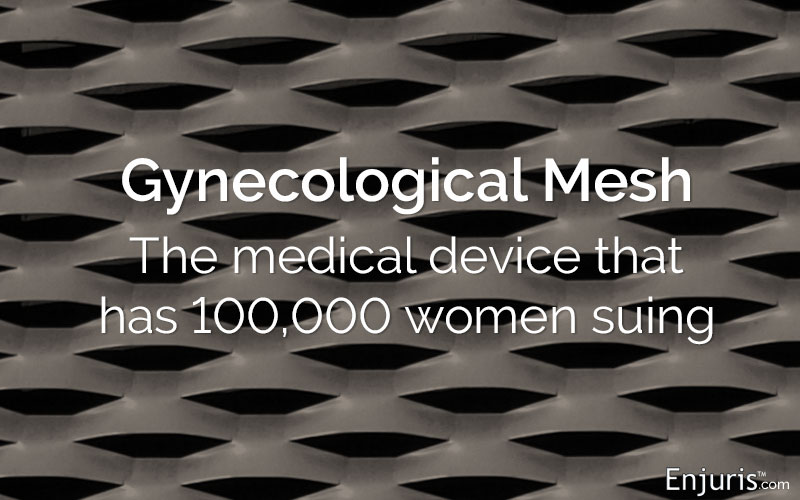
Gynecological Mesh: The medical device that has 100,000 women suing
Read the full story: Gynecological mesh: The medical device that has 100,000 women suing.
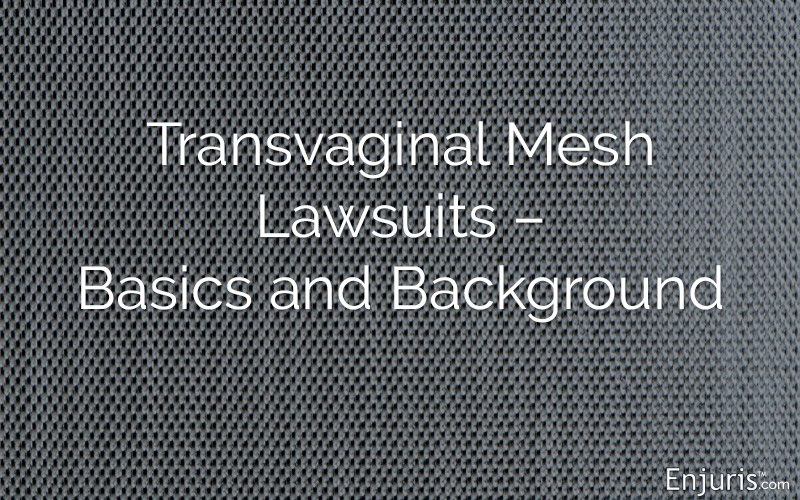
Transvaginal Mesh Basics
What is transvaginal mesh and how is it used? These medical devices have a history of lawsuits, recalls, devastating complications, and bans in some countries: Transvaginal mesh basics and lawsuits background
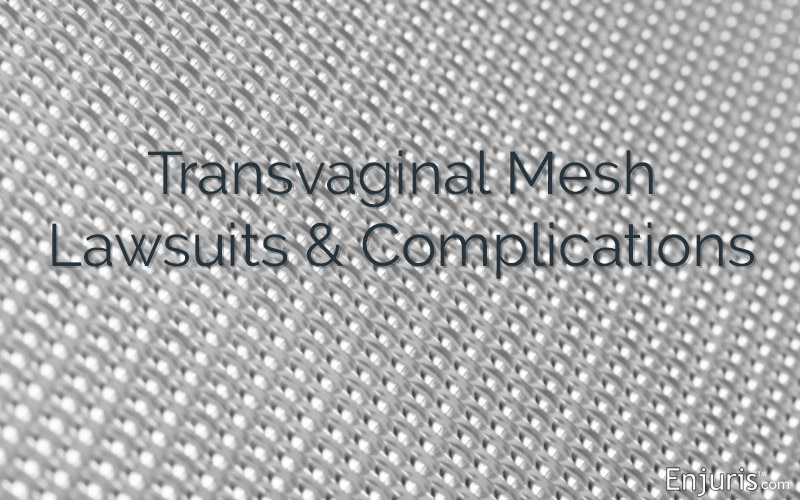
Transvaginal Mesh Lawsuits and Complications
Are you suffering from transvaginal mesh complications? See the complications that are subject of lawsuits and find out if you qualify to join a mesh lawsuit: Transvaginal mesh lawsuits and complications
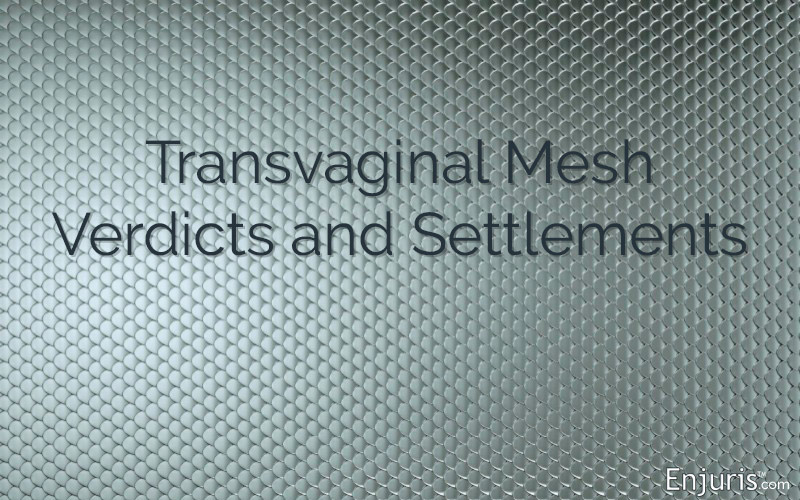
Transvaginal Mesh Settlements
Many women have joined transvaginal mesh lawsuits, and bellweather cases have set a precedent. See the range of settlement amounts and verdicts awarded to date: Transvaginal mesh settlements
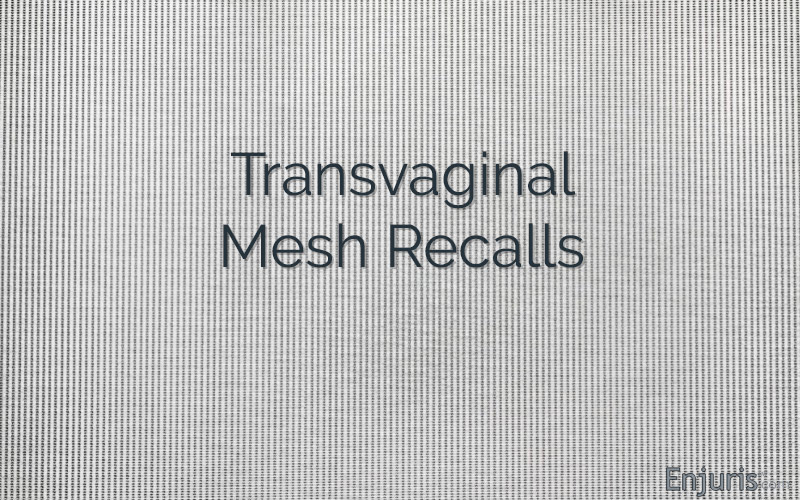
Recalls on Transvaginal Mesh Implants
The FDA has yet to recall a transvaginal mesh implant. However, numerous manufacturers have recalled their vaginal mesh products voluntarily. What you need to know: Recalls on transvaginal mesh implants

Stress Urinary Incontinence and Vaginal Mesh
SUI is when urine leakage occurs due to weak bladder muscles. Treatment with transvaginal mesh has worsened life for many women with SUI rather than improving it: Stress urinary incontinence and vaginal mesh lawsuits
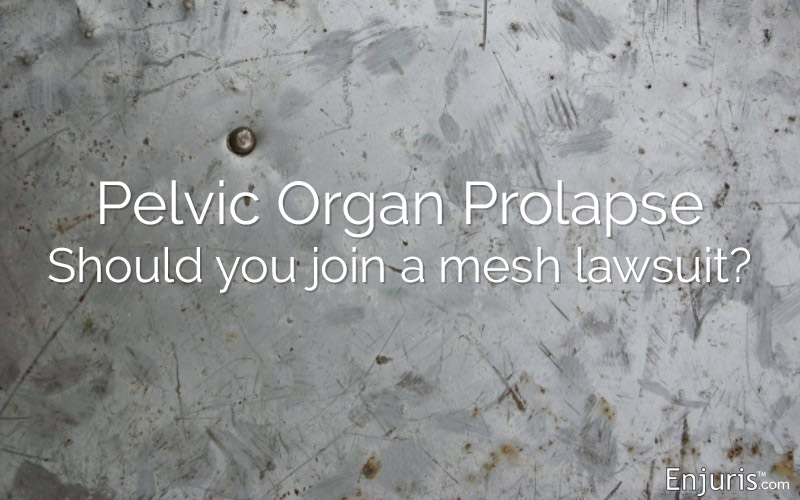
Pelvic Organ Prolapse and Vaginal Mesh
A common condition, POP has been treated with transvaginal mesh for years. There’s no evidence it helps better than other alternatives, though it clearly causes additional problems: Pelvic organ prolapse and vaginal mesh lawsuits
Number of Vaginal Mesh Lawsuits
| Defendant | Pending | Total |
|---|---|---|
| American Medical Systems | 1,264 pending lawsuits | 21,180 total lawsuits |
| Boston Scientific | 8,603 pending lawsuits | 24,334 total lawsuits |
| Coloplast | 145 pending lawsuits | 2,620 total lawsuits |
| Cook Medical | 186 pending lawsuits | 635 total lawsuits |
| C.R. Bard | 3,621 pending lawsuits | 15,568 total lawsuits |
| Ethicon | 26,393 pending lawsuits | 39,442 total lawsuits |
| ObTape | A total of 867 lawsuits were filed in this action between 2008 and 2017, though the judge asked the JPML to stop adding cases.
He stated that too many cases did not have enough evidence or that they were barred by the statute of limitations (the filing window). However, the MDL has not been closed, and six cases are pending. Women can also choose to file claims against ObTape in state court. |
|
Learn about the law in your state: Florida, Texas, Colorado, more states
Documenting your vaginal mesh lawsuit
Hiring the right lawyer for your vaginal mesh lawsuit
Which type of attorney do you need?
- When the transvaginal mesh is faulty: defective products attorneys
- When your medical caregivers are to blame: medical malpractice attorneys
- Start here to find a mesh lawyer: directory of attorneys
Choosing the right lawyer:
- Choosing a personal injury attorney – interview questions
- Preparing to meet with a personal injury attorney
- Negotiating lawyers fees - how do accident lawyers charge? Are there any hidden costs?
- How to talk to a lawyer
List of voluntary transvaginal mesh recalls/withdrawals
| Vaginal Mesh Manufacturer | Mesh Products Recalled | What Happened |
|---|---|---|
| Boston Scientific | ProteGen Sling | This is the big one, the mother of them all - the mesh monster from which all other mesh monsters were spawned. This product was cleared for sale in 1996 for stress urinary incontinence (SUI) surgeries.
It only took months before patients began reporting serious post-surgical complications. The product was voluntarily recalled in 1999, only three years after it was introduced. The ProteGen Sling was the model for a number of similar products, and because there was a "substantially similar" product already on the market, they were approved without premarket testing. That led to hundreds of thousands of additional lawsuits against various companies, many of which still have products available. |
| Mentor | ObTape vaginal sling | Discontinued in 2007, though they did not pull devices that were still available on the market. They continued to be used in pelvic surgeries. |
| C.R. Bard | Avaulta Plus, Pelvilace, Uretex | Withdrew a few of their products after there were calls for more clinical testing. |
| Ethicon | Gynecare Prolift Kit, Gynecare Prolift + M Kit, Gynecare TVT Secur, Gynecare Prosima , Pelvic Floor Repair System Kit | This division of Johnson & Johnson took 4 of its Gynecare products off the market, though they claimed it was not because of safety concerns.
They actually still sell some Gynecare devices, though they changed the labels so they are indicated for transabdominal insertion, not transvaginal. The Gynecare TVT Secur was only tested on sheep and 31 human women for five weeks before mass distribution. |
| Endo and subsidiary American Medical System (AMS) | Apogee Vaginal Vault Prolapse Repair System, Perigee Transobturator Anterior Prolapse Repair System, Elevate | This medical device manufacturer closed their Astora Women's Health division in 2016, which made their transvaginal mesh products. This was because the company had to devote billions of dollars to transvaginal mesh lawsuits. It also sold its subsidiary AMS, which produced transvaginal mesh products that were the subject of 22,000+ lawsuits, to Boston Scientific. |
News and articles on transvaginal mesh lawsuits
- Vaginal Mesh Removal – It May Leave You Worse Off
- When you need a female personal injury lawyer, will one be available?
- Transvaginal Mesh Lawsuit Settlement - Pelvic Mesh Verdicts and Payouts
- Transvaginal Mesh Implant FAQ -Transvaginal Mesh Lawsuits
- Non-State Ethicon Transvaginal Mesh Lawsuits to Stay in Pennsylvania
- New Jersey Jury Awards $15 Million in Ethicon Transvaginal Mesh Lawsuit, Bernstein Liebhard LLP
- Defense Win in Transvaginal Mesh Lawsuit Reversed
- Transvaginal Mesh Lawsuit Plaintiff Awarded $2.1 Million, As Johnson & Johnson Loses Fourth Pennsylvania Trial, Bernstein Liebhard LLP Reports
- 75 Transvaginal Mesh Lawsuits Settled - US Recall News
- Jury Awards $3.27 Million in Bellwether Transvaginal Mesh Lawsuit
- Transvaginal Mesh Lawsuit Plaintiff Recovers $2.1 Million from Johnson & Johnson
- Transvaginal Mesh Lawsuits | Ethicon Gynecare TVT Mesh Devices Withdrawn from Australia
| Date | FDA Action on Transvaginal Mesh Implants & Devices |
|---|---|
| January 6, 2017 | Surgical tools are reclassified to Class 2, which means that device manufacturers must provide premarket notification to the FDA before selling the instruments. |
| February 26, 2016 | The FDA convenes a panel to discuss the reclassification of surgical tools used in mesh surgeries. |
| January 5, 2016 | Transvaginal mesh devices are placed in Class 3 and now require premarket approval. |
| May 1, 2014 | The FDA proposed changing the device from Class 2 to Class 3, along with reclassifying the accompanying surgical tools from Class 1 to Class 2. |
| July 13, 2011 | The FDA issued an update to their 2008 notification. This stated that "complications associated with transvaginal repair of POP are not rare." They also said that these implants are a greater risk for POP patients than non-mesh surgeries. They could not even say whether mesh surgeries were more effective. |
| October 20, 2008 | The FDA issues a Public Health Notification to doctors regarding the potential risks of transvaginal mesh when used in pelvic surgeries. In two years, they received more than 1,000 reports of complication in POP and SUI patients. |
More on transvaginal mesh lawsuits
Vaginal mesh complications & lawsuits
- Transvaginal mesh basics
- Transvaginal mesh lawsuits & complications
- Transvaginal mesh settlements
- Recalls on transvaginal mesh implants
- Stress urinary incontinence & vaginal mesh
- Pelvic organ prolapse & vaginal mesh
Documenting your case
See our guide Choosing a personal injury attorney.
